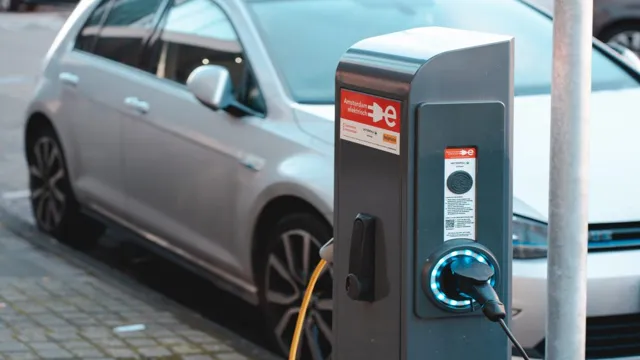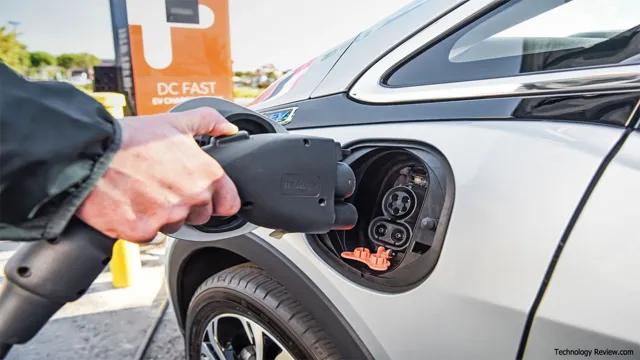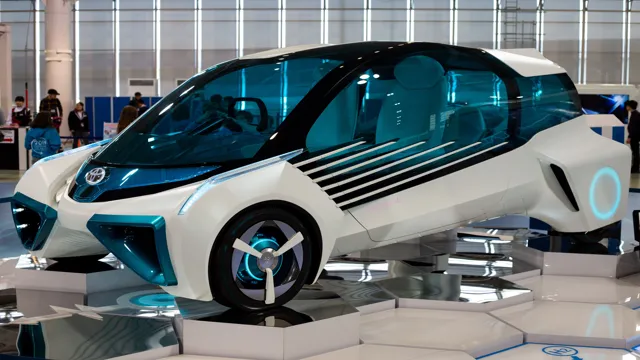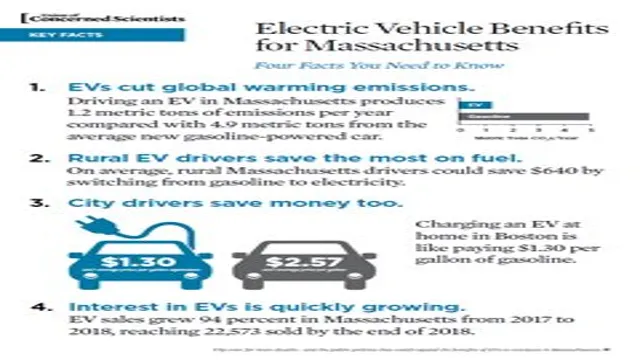Charge Up Your Savings: Exploring the Financial Benefits of Electric Cars
As the world shifts towards a more sustainable future, electric cars are becoming increasingly popular among consumers. Not only do they help reduce the carbon footprint, but they also offer significant financial benefits to owners. However, many people remain unsure about the actual financial advantages of owning electric cars.
If you’re one of them, keep reading! We’ll explore the financial perks of owning an electric car and why it’s a smart investment for the long run. So let’s dive right in!
Lower Operating Costs
One of the biggest financial benefits of owning an electric car is the lower operating costs. Unlike traditional gas-powered vehicles, electric cars don’t require regular oil changes or spark plug replacements. Additionally, the cost of electricity to charge an electric car is significantly lower than the cost of gasoline.
This means that electric car owners save money on both maintenance and fuel expenses. Furthermore, many jurisdictions offer tax incentives and rebates for purchasing a new electric car, which can further reduce the upfront costs of ownership. So not only are electric cars better for the environment, they can also be better for your wallet in the long run.
Reduced fuel and maintenance expenses
As businesses strive to reduce expenses, lower operating costs have become a top priority. One key factor in achieving this is by reducing fuel and maintenance expenses. With rising fuel prices, it’s not always easy to achieve cost savings in this area.
However, investing in fuel-efficient vehicles and equipment can make a significant difference. The initial cost may be higher, but in the long run, the fuel savings can add up. Regular maintenance and timely repairs can also help reduce fuel usage and prolong the lifespan of equipment.
Adhering to a maintenance schedule can help identify small issues before they turn into costly repairs. Additionally, opting for eco-friendly lubricants and fuels can help reduce carbon emissions, decrease maintenance costs and prolong the life of equipment. In summary, reducing fuel and maintenance expenses requires a combination of careful vehicle and equipment selection, proactive maintenance, and environmentally conscious practices.
By implementing these strategies, businesses can achieve significant cost savings and make a positive impact on the environment.
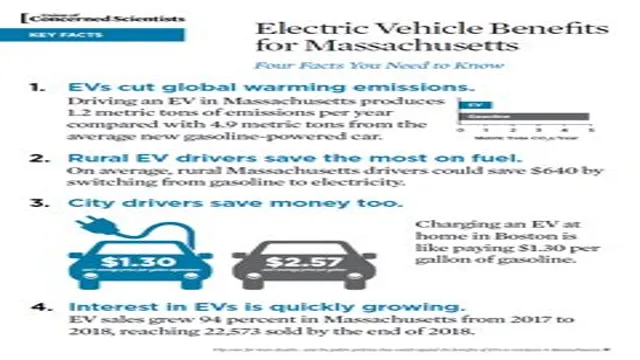
Government incentives and tax credits
One of the many benefits of investing in renewable energy is the potential for lower operating costs, thanks to government incentives and tax credits. These incentives can provide a significant financial boost to renewable energy systems, reducing the overall investment required and allowing for a faster return on investment. For example, businesses and homeowners who install solar panels on their property can take advantage of federal tax credits that cover up to 26% of the total installation cost.
Additionally, some states offer their own incentives, such as rebates or property tax exemptions. This can help reduce the overall cost of renewable energy systems, making them more accessible to a wider range of consumers. As a result, more and more individuals and businesses are turning to renewable energy as a cost-effective and sustainable solution for their energy needs.
Resale Value
One of the lesser-known financial benefits of owning an electric car is the potential for high resale value. Unlike traditional gas-powered cars that depreciate significantly over time, electric cars tend to maintain their value due to their relatively new technology and environmental friendliness. When it comes time to sell your electric car, you may be pleasantly surprised to find that it holds its value much better than a similar gas-powered car.
This can be especially advantageous if you plan on upgrading to a newer model or selling your car at the end of your lease. Ultimately, owning an electric car can provide not only an eco-friendly mode of transportation but also financial benefits that extend far beyond just saving on gas.
Electric cars retain value better than gas cars
According to various studies and reports, electric cars retain their value better than gas cars. This is great news for those who are considering purchasing an electric vehicle because it means they are likely to get more money back when they decide to sell or trade-in their car. One of the reasons why electric cars retain their value better is due to the fact that they have fewer mechanical components, which means there is less to go wrong and fewer parts that need to be replaced.
Additionally, electric cars are still relatively new to the market, so they are in high demand compared to gas cars. As electric cars become more common and the infrastructure for charging them becomes more widespread, it is likely that their resale value will continue to increase. So, not only are electric cars better for the environment and more affordable to run, but they also make a smart financial investment in the long run.
Access to exclusive electric car incentives
Access to Exclusive Electric Car Incentives for Resale Value One of the many benefits of owning an electric car is the access to exclusive incentives that can significantly boost your resale value. Many states and local governments offer incentives such as tax credits, rebates, and other financial incentives to encourage the adoption of electric cars. By taking advantage of these incentives, you can not only enjoy a reduced cost of ownership but also attract potential buyers when it comes time to resell.
In addition, electric cars tend to hold their value better than their gas-powered counterparts, thanks to factors such as lower maintenance costs, longer warranties, and increased demand from environmentally conscious consumers. So, owning an electric car not only saves you money, but it can also be an investment in your financial future. Take advantage of these exclusive incentives today and enjoy a better resale value for your electric car.
Environmental Benefits
When it comes to owning an electric car, financial benefits are not the only perks. Electric vehicles also offer a range of environmental benefits that can make a big impact on our planet. For starters, electric cars produce fewer emissions than their fossil fuel counterparts.
This is because they don’t require gasoline or diesel fuel, which releases harmful gases like carbon monoxide and nitrogen oxide into the air. Instead, they run on electricity, which can be generated from clean energy sources like solar and wind power. Additionally, because electric cars don’t have tailpipes, they don’t emit any pollutants into the surrounding environment.
This means that electric cars can make a significant contribution in reducing air pollution in urban areas. Overall, owning an electric car not only benefits your wallet, but also the environment.
Reduced emissions and environmental impact
Reduced emissions from sustainable practices not only benefit the environment but also contribute to healthier communities. By investing in renewable energy sources, reducing energy consumption, and implementing eco-friendly practices, we can help reduce carbon emissions that are detrimental to the planet. Lowering the use of fossil fuels not only helps reduce carbon dioxide but also decreases the amount of other pollutants that contribute to respiratory illnesses, cancers, and other health-related issues.
In addition to these benefits, sustainable practices can lead to cost-savings, energy-efficient infrastructure, and enhance the company’s reputation and brand image. Making small yet meaningful changes such as investing in solar panels, using LED lighting, or implementing recycling programs can contribute to a healthier planet and cut down on environmental impact. By embracing sustainable practices, we can work towards a cleaner, healthier, and more sustainable future for generations to come.
Green energy integration
Green energy integration has numerous environmental benefits that can significantly reduce the negative impact of traditional energy sources on our planet. One of the most significant advantages of green energy integration is the reduction of harmful greenhouse gas emissions. By utilizing renewable energy sources like solar, wind, and hydro power, we can decrease our reliance on fossil fuels and reduce the amount of carbon dioxide released into the atmosphere.
This, in turn, can mitigate the adverse effects of climate change such as rising sea levels, extreme weather conditions, and loss of biodiversity. Additionally, green energy integration can conserve water resources by decreasing the amount of water consumed during energy production processes. Fossil fuel-based power plants are known to significantly deplete water resources, which can have disastrous implications on areas experiencing drought.
By switching to renewable energy, we can reduce our water usage, thus mitigating the risk of water scarcity. Overall, green energy integration is essential as it can help protect our planet’s natural resources while simultaneously providing clean, sustainable energy for generations to come.
Long-Term Savings
Looking to save money in the long-term? Consider investing in an electric car. While the initial cost may be higher compared to traditional gasoline-powered cars, electric cars offer numerous financial benefits over time. For starters, electric cars have significantly lower operating costs.
Unlike gas cars, which require frequent fueling and maintenance, electric cars can run on electricity for a fraction of the cost. Additionally, electric cars require less frequent maintenance and repair due to fewer moving parts. This can lead to significant savings over time.
Also, electric cars often have higher resale value compared to gas cars. In short, investing in an electric car not only benefits the environment but can also lead to substantial long-term financial savings.
Overall cost savings compared to gas cars
When it comes to the overall cost savings of electric cars compared to gas-powered vehicles, the long-term savings can be significant. While an electric car may have a higher initial cost, it more than makes up for it over time with lower maintenance costs and cheaper fuel. With electric cars, you can avoid regular oil changes, engine tune-ups, and other costly repairs that are required for gas cars.
Additionally, charging an electric car at home is much cheaper than filling up at the gas pump, leading to even more long-term savings. In fact, studies have shown that over the lifespan of a car, electric vehicles can save owners up to $10,000 in fuel and maintenance costs compared to gas cars. So, while an electric car may require a larger upfront investment, the long-term savings make it a smart choice for those looking for a more cost-effective and environmentally friendly option.
Conclusion
In conclusion, investing in an electric car not only benefits the environment, but it can also provide numerous financial benefits. With lower maintenance costs, reduced fuel expenses, and potential tax incentives, switching to an electric car can help you save on expenses while also making a positive impact on the planet. Plus, let’s face it, who wouldn’t want to feel like a savvy and eco-conscious driver cruising down the road in a sleek and stylish electric car? It’s a win-win situation for your wallet and the world!”
FAQs
What are the financial benefits of an electric car?
Electric cars offer numerous financial benefits, including lower fuel costs, reduced maintenance costs, and tax credits or incentives. They also tend to have a longer lifespan than traditional gasoline-powered cars.
Is it cheaper to maintain an electric car than a gasoline car?
Yes, electric cars generally require less maintenance than gasoline cars. They do not need oil changes, have fewer moving parts, and regenerative braking can help extend the lifespan of brake pads.
Can you save money on taxes and incentives by owning an electric car?
Yes, many federal and state governments offer tax credits or incentives for electric vehicle owners. These can include a federal tax credit of up to $7,500 and state incentives such as rebates or HOV lane access.
How do the fuel costs of an electric car compare to a gasoline car?
The fuel costs of an electric car are typically much lower than gasoline cars. This is because electricity is cheaper than gasoline, and electric cars can travel many miles on a single charge. The cost of ownership can be significantly lower over the vehicle’s lifetime.


